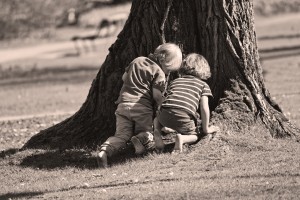Learning the Natural Way
 On Fridays, my granddaughter gets out of school at noon to join her mom and other parents for Forest Friday in the Pisgah Forest. This is not a school-sponsored class. This is parents taking their children into the forest for discovery and learning in a natural setting. Any student, child, teenager or adult will retain around 90% of what they are actively involved in. My granddaughter shared her excitement with me about Forest Friday on Sunday afternoon. She remembered the trail, the waterfall, the dividing of the trails and a fire pit. I’ve watched her and her sister playing in the woods. They pick up stones and examine them. They climb rockpiles. They hide under blackberry bushes and eat until they’re purple. Can you remember doing these things when you were young?
On Fridays, my granddaughter gets out of school at noon to join her mom and other parents for Forest Friday in the Pisgah Forest. This is not a school-sponsored class. This is parents taking their children into the forest for discovery and learning in a natural setting. Any student, child, teenager or adult will retain around 90% of what they are actively involved in. My granddaughter shared her excitement with me about Forest Friday on Sunday afternoon. She remembered the trail, the waterfall, the dividing of the trails and a fire pit. I’ve watched her and her sister playing in the woods. They pick up stones and examine them. They climb rockpiles. They hide under blackberry bushes and eat until they’re purple. Can you remember doing these things when you were young?
I recently read an article by Barabar Danze in The Epoch Times January 30, 2020 issue. She encouraged parents to take a step back and relax when educating children. She recommended reading freely, enjoying nature, playing, and exploring to recover the spark of curiosity and wonder so many children have lost in our world of four walls and technology.
Ms. Danze says true learning is a simple and natural process. As parents, we have already taught our children to talk, walk, eat and lots of other important skills. We did it naturally following our child’s development and natural curiosities. We didn’t try to teach them to walk as newborns or to potty train at six months. We waited for our children to be developmentally ready.
As parents, we learn as we teach our children. We are designers of the learning environment where we become the facilitators of our children’s natural learning process. Each child has his/her individual learning styles and interest. What sparks your child’s interest while exploring and playing can yield lasting and valuable lessons that are eagerly absorbed.
When my son was a child, the father of my Friday Forest granddaughter, we hiked, fished, camped and just played outside. It piqued his interest in biology. His deeper study of biology led him into his lifelong work. He owns his own fly fishing guide business. He still studies the insects, and seasons of the hatch. He studies trout and other fish to know what insects they are feeding on and how the temperature of the water affects the insect hatch and the feeding habits of the fish. He also needs to keep records of rainfall to know how the amount of water in the rivers is affecting the fish. He is a lifelong learner because of his natural explorations as a child. He is also beginning to publish articles about fishing, their ecosystem and other things that are way over my head.
I think Ms. Danze has a handle on educating our children. I have experienced its effects on my own family. I want to be more proactive in getting my school children as well as my grandchildren out into nature. Just the other day at recess two of the girls wanted to take their sand buckets on “a leaf treasure hunt”. They came back with leaves and a lot more “treasures”. They wanted to show me their collections, to tell me about the treasures and ask questions. I suspect this adventure will lead to more learning in the days and weeks ahead.
How about you. How are you facilitating learning for the children in your life?
Happy educating, Gail Cartee

This is such a great reminder. I feel sorry that children today do not enjoy spending hours of “unstructured” time out of doors like I did as a child.
We did plenty of investigation, observation, drawing conclusions and decision making while we “played” outside.
Jean, you are so right and we learned how to settle disagreements and still be friends. Amazing what can be learned in “play”.
I love this post. Learning has evolved into something so rigid over the past few decades, when it should be a joy! My daughter homeschools her children and getting outdoors and playing is a big part of it. Or she’ll read to them all while they play outside. They have a family goal to have 1000 hours of outdoor time this year. They love learning and discovering the world around them!
Linda, thanks for your encouraging comments. Your daughter will never regret a minute of it.
I, too, want to give our grandchildren more time outdoors exploring nature. Thanks for this encouragement!
Nancy, thanks for your comments. I know you will make great memories for yourself and your grandchildren. Happy exploring.
Each moment is an opportunity for teaching and learning. Even in the quiet moments, we can learn.
Yes Melissa, seems the quiet times are when the voices of learning speak the loudest. Children as well as adults need time to just be quiet.